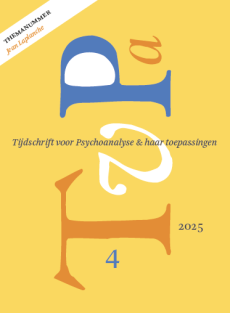Indicatiestelling voor psychoanalyse en het Ontwikkelingsprofiel
Summary
During the process of deciding on the appropriate psychoanalytic treatment, the Developmental Profile can support the analyst in his or her diagnostic, informative and scientific roles. This instrument, which has proved to be a reliable and valid tool in empirical research, provides a description of the personality structure, with special reference to the adaptive and maladaptive aspects of the patient’s behaviour. After an examination of the structure and application of the developmental profile, two clinical examples are presented: a developmental profile of a failed psychoanalysis and a profile of a positive indication for psychoanalysis. Finally, the potential for complementary use of the information obtained during the initial psychoanalytic interview (with anamnestic and biographical information) are discussed, together with information from the Developmental Profile.
Literatuur
- Abraham, R.E. (1993). The Developmental Profile: the psychodynamic diagnosis of personality. Journal of Personality Disorders, 7, 105-115.
- Abraham, R.E. (1997). Het Ontwikkelingsprofiel, een psychodynamische diagnose van de persoonlijkheid. Assen: Van Gorcum.
- Abraham, R.E., Van, H.L., Foeken, I. van, Ingenhoven, T.J.M., Tremonti, W., Pieper-de Vries, I., Groot, J. de, Spijker, A. van ’t, & Spinhoven, Ph. (2001). The Developmental Profile. Journal of Personality Disorders, 15 (5), 457-473.
- Erikson, E.H. (1963). Childhood and Society. Londen: Imago.
- Freud, A. (1963). The concept of developmental lines. The Psychoanalytic Study of the Child, 18, 245-265.
- Freud, A. (1965). Normality and Pathology in Childhood: Assessments of Development. New York: International Universities Press.
- Freud, A., Nagera, H, & Freud, W.E. (1965). Metapsychological assessment of the adult personality: The adult profile. The Psychoanalytic Study of the Child, 20, 9-41.
- Freud, S. (1905). Three essays on the Theory of Sexuality. Standard Edition 7 (p. 123-243). Londen: Hogarth Press.
- Galatzer-Levy, R.M., Bachrach, H., Skolnikoff, A. & Waldron, S. (2000). Does psychoanalysis work? New Haven CT/Londen: Yale University Press.
- Ladan, A. (1993). Over de voorspellende waarde van het indicatiestellingsonderzoek. In A. Ladan (red.), Op de bank (p. 25-42). Amsterdam/Meppel: Boom.
- Loevinger, J. & Wessler, R. (1970). Measuring Ego Development. San Francisco: Jossey-Bass.
- Kohlberg, L. (1981). The Philosophy of Moral Development. Moral Stages and the Idea of Justice. San Francisco: Harper & Row.
- Kohut, H. (1971). The Analysis of the Self. New York: International Universities Press.
- Piaget, J. (1962). The Stages of the Intellectual Development of the Child. Bulletin of the Menninger Clinic, 26, 120-128.
- Stone, L. (1954). The widening scope of indications for psychoanalysis. Journal of the American Psychoanalytic Association, 2, 567-594.
- Wille, R.S.G. (2001). There is no such thing as a patient. In A.R. Boerwinkel & W.J. Gomperts (red.), Alleen en met z’n tweeën (p. 20-33). Assen: Van Gorcum.
 © 2009-2026 Uitgeverij Boom Amsterdam
© 2009-2026 Uitgeverij Boom Amsterdam
ISSN 1382-516x
De artikelen uit de (online)tijdschriften van Uitgeverij Boom zijn auteursrechtelijk beschermd. U kunt er natuurlijk uit citeren (voorzien van een bronvermelding) maar voor reproductie in welke vorm dan ook moet toestemming aan de uitgever worden gevraagd:
Behoudens de in of krachtens de Auteurswet van 1912 gestelde uitzonderingen mag niets uit deze uitgave worden verveelvoudigd, opgeslagen in een geautomatiseerd gegevensbestand, of openbaar gemaakt, in enige vorm of op enige wijze, hetzij elektronisch, mechanisch door fotokopieën, opnamen of enig andere manier, zonder voorafgaande schriftelijke toestemming van de uitgever.
Voor zover het maken van kopieën uit deze uitgave is toegestaan op grond van artikelen 16h t/m 16m Auteurswet 1912 jo. Besluit van 27 november 2002, Stb 575, dient men de daarvoor wettelijk verschuldigde vergoeding te voldoen aan de Stichting Reprorecht te Hoofddorp (postbus 3060, 2130 KB, www.reprorecht.nl) of contact op te nemen met de uitgever voor het treffen van een rechtstreekse regeling in de zin van art. 16l, vijfde lid, Auteurswet 1912.
Voor het overnemen van gedeelte(n) uit deze uitgave in bloemlezingen, readers en andere compilatiewerken (artikel 16, Auteurswet 1912) kan men zich wenden tot de Stichting PRO (Stichting Publicatie- en Reproductierechten, postbus 3060, 2130 KB Hoofddorp, www.cedar.nl/pro).
No part of this book may be reproduced in any way whatsoever without the written permission of the publisher.
Nieuwsbrief Boom Psychologie
Meld u nu aan en ontvang maandelijks de Boom Psychologie nieuwsbrief met aantrekkelijke aanbiedingen en de nieuwe uitgaven.
Aanmelden


